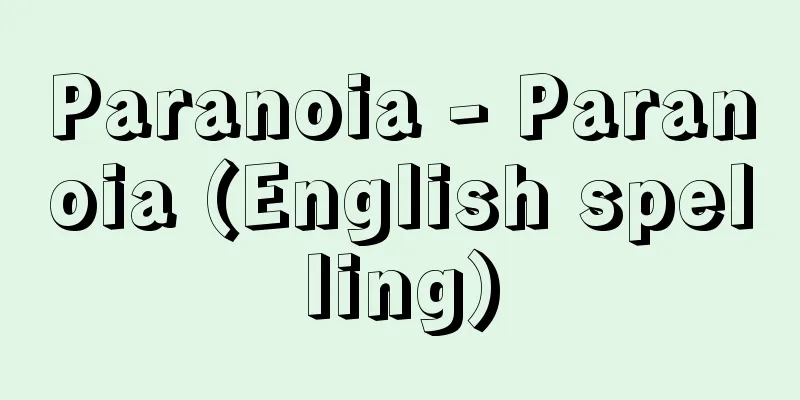Paranoia - Paranoia (English spelling)

|
Also known as paranoia or delusional disorder, this is a condition in which a person continues to have persistent delusions, although their thoughts and actions, excluding the delusions, are consistent. Hallucinations, especially auditory hallucinations, do not accompany the condition, and it develops gradually from middle age onwards, and is more common in men. The contents of the delusions include grandiose ones such as delusions of lineage (in which the patient is convinced that he or she is of noble descent), delusions of invention, and delusions of religion, as well as delusions of victimization (persecution) in which the patient believes that his or her status, property, and life are being threatened, delusions of jealousy (in which the patient is convinced that his or her spouse is unfaithful), delusions of litigation (in which the patient is convinced that he or she has suffered a disadvantage and fights relentlessly to recover his or her rights), and hypochondriacal delusions (in which the patient is convinced that he or she has a physical abnormality). In general, the ego is elevated and shows persistent strength and irritability. There is still no consensus today, and some view paranoia as an independent disorder, some as a type of schizophrenia, and some that it can be understood based on certain predispositions, life history, and circumstances. Paraphrenia is a condition that involves not only delusions but also hallucinations, and involves relatively little personality disruption; in many cases it is included in schizophrenia. [Hideo Yasuzaki] "Hideo Yasuzaki's Hallucinations (1999, Life Sciences)" [References] | | |Source: Shogakukan Encyclopedia Nipponica About Encyclopedia Nipponica Information | Legend |
|
偏執病、妄想症ともいわれ、頑固な妄想のみをもち続けている状態で、その際に妄想の点を除いた考え方や行動は首尾一貫しているものである。 幻覚、とくに幻聴は伴わず、中年以降に徐々に発症し、男性に多い。妄想の内容は、高貴な出であると確信する血統妄想、発明妄想、宗教妄想などの誇大的内容のものをはじめ、自分の地位・財産・生命を脅かされるという被害(迫害)妄想、連れ合いの不貞を確信する嫉妬(しっと)妄想、不利益を被ったと確信して権利の回復のための闘争を徹底的に行う好訴妄想、身体的な異常を確信している心気妄想などがある。一般には、自我感情が高揚して持続的な強さや刺激性を示している。 パラノイアを独立疾患とみる立場と、統合失調症の一類型とみる立場、あるいは一定の素質と生活史や状況から理解できるという立場などがあって、今日なお一定した見解はない。 なお、パラフレニーparaphreniaは妄想だけでなく幻覚も伴うもので、人格の崩れの比較的少ないものをいい、多くは統合失調症に含まれている。 [保崎秀夫] 『保崎秀夫著『幻覚』(1999・ライフサイエンス)』 [参照項目] | | |出典 小学館 日本大百科全書(ニッポニカ)日本大百科全書(ニッポニカ)について 情報 | 凡例 |
>>: Paranaguá (English spelling)
Recommend
Technology transfer
Generally, this refers to the transfer of advance...
Fried chicken
A type of processed tofu. Tofu is placed in a bag...
IMSinger & Co. (English)
… [Tokuda Kenji]. … *Some of the terms mentioned ...
Cassiopeia - Cassiopeia
A constellation that rises high in the northern s...
Umami seasoning - Umamiryo
…Ingredients used to flavor and adjust food and d...
Ooppana - Ooppana
...There are many local names for this fish, such...
Deborah
...588m above sea level. According to the Old Tes...
Keiga Kawahara
Year of death: Unknown (Year of death unknown) Yea...
Teosinte (English spelling)
It is an annual grass of the grass family (APG cl...
What it means - What it means
…The functions of these similarity associations a...
Tuberculous arthritis
…In recent years, fungal infections have occasion...
Edible plants - edible plants
Plants that humans eat. Humans eat not only plant-...
Shirasawa [village] - Shirasawa
A village in Adachi County in central Fukushima Pr...
Opium trafficking case - opium trafficking case
…The word 'saga' originally meant a case ...
Gojo Yorimoto
A Southern Court official and military commander....









